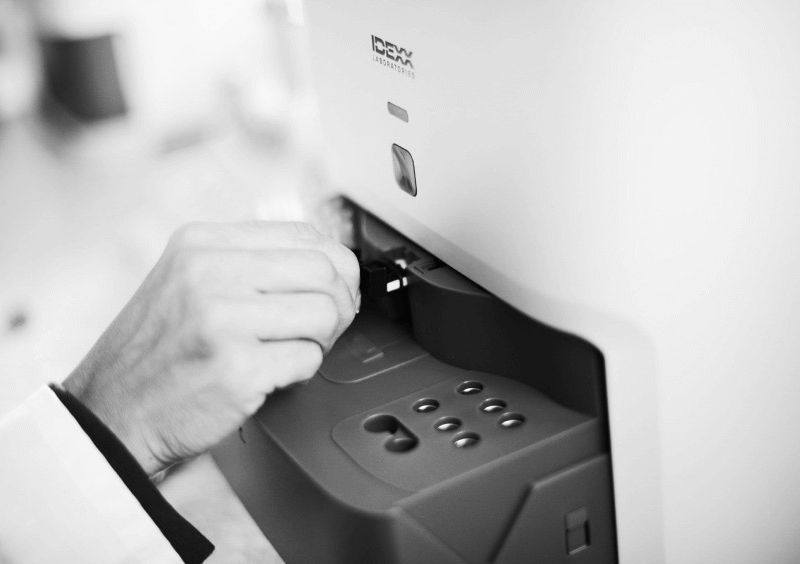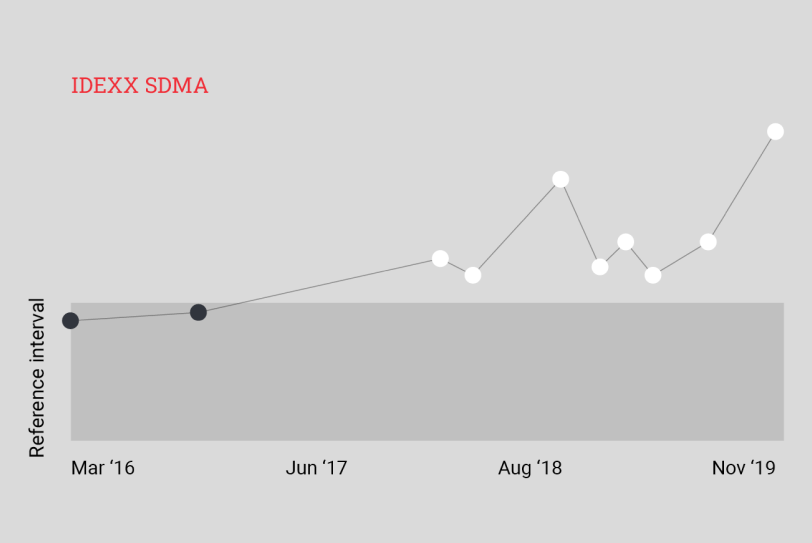IDEXX kidney health solutions
Kidney function is a vital window into your patient's overall health, but you can't manage what you can't see. Our suite of tests and technologies sheds light on your patient's kidney health, helping you intervene earlier and treat with greater confidence.

Diagnostics, technology, and support for deeper insights into every patient’s kidney health.
Diagnostic solutions
Holistic solutions for better visibility into your patient’s kidney health.
Diagnostic solutions
The tools you need to assess kidney function, injury, and management of treatment—resulting in better outcomes throughout the life of your patients.

Deeper insights, earlier.
IDEXX SDMA testing
Whether in-house or at the reference lab, SDMA can keep you ahead of the curve when it comes to declining kidney function—detecting mild to moderate loss that creatinine misses.1–3
Including SDMA in your chemistry profile adds substantial value for both the sick and well patient in the early detection of primary renal diseases as well as the reflection of impact on renal health caused by concurrent diseases.2–14

Undetectable kidney injury is now detectable.
IDEXX Cystatin B Test
With the the IDEXX Cystatin B Test, IDEXX’s kidney health suite is more comprehensive than ever. Never before have veterinarians been able to detect active or acute injury to the kidneys. Now with the IDEXX Cystatin B Test, a simple urine-based test, you can uncover kidney injury when clinical signs may or may not be apparent and gain additional insights beyond the changes in functional markers such as SDMA and creatinine.

Stay ahead of phosphorus overload.
IDEXX FGF-23 Test
The IDEXX FGF-23 Test is an entirely new method to manage and monitor phosphorus overload in cats with chronic kidney disease (CKD) and is now included in the IRIS Treatment Recommendations for CKD in Cats.15
The IDEXX FGF-23 Test can enable confident treatment recommendations, such as diet changes, and it can offer early detection of metabolic bone disease in cats with IRIS CKD Stages 1 and 2.16,17

Round out your view.
Complete urinalysis and UPC
A complete urinalysis and urine protein:creatinine (UPC) ratio contribute to a deeper view of kidney health. Looking at urine specific gravity (USG) also provides needed context regarding hydration status as well as kidney function when interpreted alongside the functional kidney biomarkers. In addition, including a UPC ratio may aid in the diagnosis and treatment of CKD. Complete urine testing is integral to confidently assess your patients' kidney health status.
Tools and technologies
From patient-specific insights to individualised baselines, our ever-evolving suite of tools and technologies gives you everything you need to make a confident decision—right alongside your results (both in-house and reference lab).
Every patient is unique. So is their baseline.
VetConnect PLUS
A single test result, while important, is limited in value with nothing to compare it to. This makes routine monitoring of kidney health essential for patients whether they are sick, well, juvenile, or geriatric. With VetConnect PLUS, you can establish an individualised baseline for every patient, spot trends, and review patient history all in one place.
You can also access differential diagnoses in VetConnect PLUS to help interpret patient results, along with guidance from the latest industry protocols, research, and publications.

Global support
We’re here for you every step of the way.

Never go it alone.
Our global network of support gives you easy access to a medical consult when you need a sounding board or have questions on next steps. You also have a dedicated team of local IDEXX professionals who are available to support your business, providing guidance and training to optimise your workflow or to help you implement new protocols.
Here’s a quick guide to the teams of people and resources available in person, on the phone, online, and on demand:
In person
Veterinary Diagnostic Consultants
Frequent in-house visits and personalised support.
Professional Services Veterinarians
Personalised on-site medical consultations and education.
Field Support Representatives
Step-by-step guidance and training on-site to help optimise your workflow.
On the phone and online
Medical Consultants
Get direct live access and personalised guidance from board-certified specialists.
Pathologists
Get personal attention from a pathologist who will be dedicated to your case from beginning to end and be available via direct phone line or email.
Customer Support
Dedicated to answering all your questions on laboratory services, test requests, results status, and more.
On demand
Hundreds of free courses are available at the IDEXX Learning Center so you can learn on your own schedule on any device. Learn the importance of SDMA, how to stage CKD, and access quick, clear videos on how to run the SDMA test. You can even attain CE credit.
References
- Hall JA, Yerramilli M, Obare E, Yerramilli M, Jewell DE. Comparison of serum concentrations of symmetric dimethylarginine and creatinine as kidney function biomarkers in cats with chronic kidney disease. J Vet Intern Med. 2014;28(6):1676–1683. doi:10.1111/jvim.12445
- Nabity MB, Lees GE, Boggess MM, et al. Symmetric dimethylarginine assay validation, stability, and evaluation as a marker for early detection of chronic kidney disease in dogs. J Vet Intern Med. 2015;29(4):1036–1044. doi:10.1111/jvim.12835
- Hall JA, Yerramilli M, Obare E, Yerramilli M, Almes K, Jewell DE. Serum concentrations of symmetric dimethylarginine and creatinine in dogs with naturally occurring chronic kidney disease. J Vet Intern Med. 2016;30(3):794–802. doi:10.1111/jvim.13942
- Hall JA, Yerramilli M, Obare E, Yerramilli M, Yu S, Jewell DE. Comparison of serum concentrations of symmetric dimethylarginine and creatinine as kidney function biomarkers in healthy geriatric cats fed reduced protein foods enriched with fish oil, L-carnitine, and medium-chain triglycerides. Vet J. 2014;202(3):588–596. doi:10.1016/j.tvjl.2014.10.021
- Nabity MB. Traditional renal biomarkers and new approaches to diagnostics. Toxicol Pathol. 2018;46(8):999–1001. doi:10.1177/0192623318800709
- Hall JA, Yerramilli M, Obare E, Li J, Yerramilli M, Jewell DE. Serum concentrations of symmetric dimethylarginine and creatinine in cats with kidney stones. PLoS One. 2017;12(4):e0174854. doi:10.1371/journal.pone.0174854
- Burton W, Drake C, Ogeer J, et al. Association between exposure to Ehrlichia spp. and risk of developing chronic kidney disease in dogs. J Am Anim Hosp Assoc. 2020;56(3):159–164. doi:10.5326/JAAHA-MS-7012
- Dahlem DP, Neiger R, Schweighauser A, et al. Plasma symmetric dimethylarginine concentration in dogs with acute kidney injury and chronic kidney disease. J Vet Intern Med. 2017;31(3):799–804. doi:10.1111/jvim.14694
- Drake C, Coyne M, McCrann DJ, Buch J, Mack R. Risk of development of chronic kidney disease after exposure to Borrelia burgdorferi and Anaplasma spp. Top Companion Anim Med. 2021;42:100491. doi:10.1016/j.tcam.2020.100491
- Szlosek D, Robertson J, Quimby J, et al. A retrospective evaluation of the relationship between symmetric dimethylarginine, creatinine and body weight in hyperthyroid cats. PLoS One. 2020;15(1):e0227964. doi:10.1371/journal.pone.0227964
- Yerramilli M, Farace G, Quinn J, Yerramilli M. Kidney disease and the nexus of chronic kidney disease and acute kidney injury: the role of novel biomarkers as early and accurate diagnostics. Vet Clin North Am Small Anim Pract. 2016;46(6):961–993. doi:10.1016/j.cvsm.2016.06.011
- Mack RM, Hegarty E, McCrann DJ, Michael HT, Grauer GF. Longitudinal evaluation of symmetric dimethylarginine and concordance of kidney biomarkers in cats and dogs. Vet J. 2021;276:105732. doi:10.1016/j.tvjl.2021.105732
- Michael HT, Mack RM, Hegarty E, McCrann DJ, Grauer GF. A longitudinal study of the persistence of increased creatinine and concordance between kidney biomarkers in cats and dogs. Vet J. 2021;276:105729. doi:10.1016/j.tvjl.2021.105729
- Data on file at IDEXX Laboratories, Inc. Westbrook, Maine USA.
- International Renal Interest Society. Announcement of changes to IRIS guidelines. Accessed February 8, 2023. www.iris-kidney.com/guidelines/guidelines_updates_2023.html
- Geddes RF, Elliott J, Syme HM. The effect of feeding a renal diet on plasma fibroblast growth factor 23 concentrations in cats with stable azotemic chronic kidney disease. J Vet Intern Med. 2013;27(6):1354–1361. doi:10.1111/jvim.12187
- Geddes RF, Biourge V, Chang Y, Syme HM, Elliott J. The effect of moderate dietary protein and phosphate restriction on calcium-phosphate homeostasis in healthy older cats. J Vet Intern Med. 2016;30(5):1690–1702. doi:10.1111/jvim.14563
- Data on file at IDEXX Laboratories, Inc. Westbrook, Maine USA. Individual results will vary based upon each patient’s case complexity and practitioner’s IRIS CKD staging experience.
www.idexx.com/en/veterinary/reference-laboratories/sdma/sdma-iris/#vetconnectplus